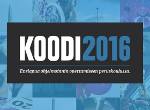Koodi2016 guide to help teaching coding in comprehensive school

The Koodi2016 guidebook and website were made public at the World Championships in coding held at Helsinki's Cable Factory on 10 June 2014. They are intended as first aid for teachers and decision-makers in the field of education when programming becomes part of the comprehensive school curriculum in the autumn of 2016. The Koodi2016 guide tells what coding is, why it is important, how teachers can succeed in their task, and how the basics of coding can be taught in comprehensive school. The Ministry of Transport and Communications, which has supported the publication of the book, is one of the collaborative partners in the project. Developing a digital society requires active measures. Minister of Education and Communications Krista Kiuru says that people need to have the ability to come up with ideas, and the skills to produce solutions that move us forward as a society. "In this change, programming is a necessary tool that creates new things. I am looking forward with interest and with confidence to a future in which today's children use electronic services as readily as they design or build them digitally themselves."
Society's activities are based to a significant degree on the utilisation of different kinds of electronic and communications networks, and on the use of digital services and content that are made possible by the networks.
"There is reason to pay more attention than before to the utilisation of the growth potential of information and communications technology, as well as digital services in the promotion of employment and economic growth. The digital basics are learned in school", Minister Kiuru points out.
Programming will not become a separate subject. It will be taken as part of the content of the curricula of the subjects taught in comprehensive school. The reason for doing so is that understanding the basics of a programming language is seen to be part of the skills from an all-round education.



